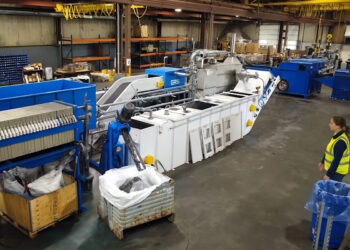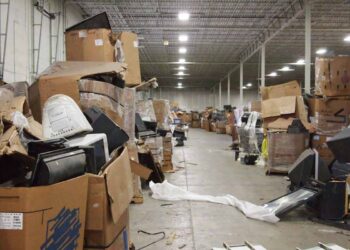Credit: sirtravelalot/Shutterstock
An e-scrap company is accusing a Sprint subsidiary of failing to follow through on a supplier contract. The processor is asking for roughly $1.7 million in damages.
Los Angeles-headquartered IT Asset Partners (ITAP) filed suit in December against Sprint/United Management Company, a subsidiary of Sprint Corporation. The complaint was filed Dec. 12 in U.S. District Court for the District of Kansas.
The allegations stem from several business transactions in early 2017. The suit claims two counts of breach of contract, one for Sprint allegedly shipping fewer devices than ITAP paid for and another for misrepresenting the cosmetic grade of purchased devices. ITAP also alleges one count of negligent misrepresentation, also based on alleged cosmetic grade discrepancies.
The asset recovery company seeks a judgment of more than $1.7 million in damages, plus interest.
Sprint has not yet filed a response. The deadline to respond was initially in early January but has been extended to early March. A Sprint spokesperson told E-Scrap News the company is aware of the lawsuit and will file a response with the court but declined to comment further. The legal action was first reported in December by the Kansas City Business Journal.
Device count and quality allegations
The disputes arose after ITAP in early 2017 submitted and won a number of bids to purchase phones from Sprint.
ITAP claims it was shorted nearly 700 devices in early 2017 on orders that should have totaled 3,900 used phones. ITAP disposes the unused portions of the devices after recovering what it can. The company requested Sprint issue a $127,416 refund but alleges Sprint refused.
ITAP also expresses concern in the filing that it could be held liable for any data breach from the devices it never received, because the contract between the companies stipulates it is responsible for ensuring data security on the devices it ordered.
In a dispute stemming from separate phone orders, ITAP also claims Sprint misrepresented the quality of product it was sending. Under the contract, each load of devices would be assigned a letter grade for quality. An A grade indicated devices that were “like new.” At the other end of the spectrum, an E grade indicates “heavy wear and tear with cracked glass and damaged LCD.”
The asset recovery company “had no interest in purchasing any goods with an ‘E’ cosmetic grade (or worse), because those goods could not be used” in ITAP’s recovery process, according to the complaint.
In late February, ITAP placed orders for a combined 2,621 devices, including Samsung Galaxy S7 and S7 Edge units described as “D” grade, meaning they had heavy wear and tear with cracked glass, but not a damaged LCD. However, ITAP claims, they arrived in much worse condition, what ITAP describes as “E” grade. The devices were “burned, bent and had damaged LCDs,” according to ITAP.
”In fact, some of the ‘phones’ received by Plaintiff were nothing more than the back cover of the phone and the actual phone was not included in the shipment Plaintiff received,” ITAP’s attorneys wrote.
In March, ITAP placed orders for 1,686 Samsung Note 5 and S6 Edge devices and separate orders for 2,510 Samsung Note 5, S6 Edge+ and S7 Edge units. These units ranged in stated quality from “B” to “D.” But ITAP alleges they were in worse shape than Sprint had described, with burned, bent and damaged LCDs.
ITAP tried to return the devices received in the orders that led to quality disputes. It sought to have its $806,090 refunded, but the company claims Sprint refused to accept the return.
ITAP was in the news last summer when its founder and former CEO, Eric Lundgren, plead guilty to criminal copyright infringement and conspiracy to traffic in counterfeit goods. The case centered on unauthorized Microsoft Windows reinstallation CDs Lundgren was involved in supplying for use in refurbished Dell computers. Lundgren, who stepped down as CEO last summer, is currently appealing his prison sentence.


























